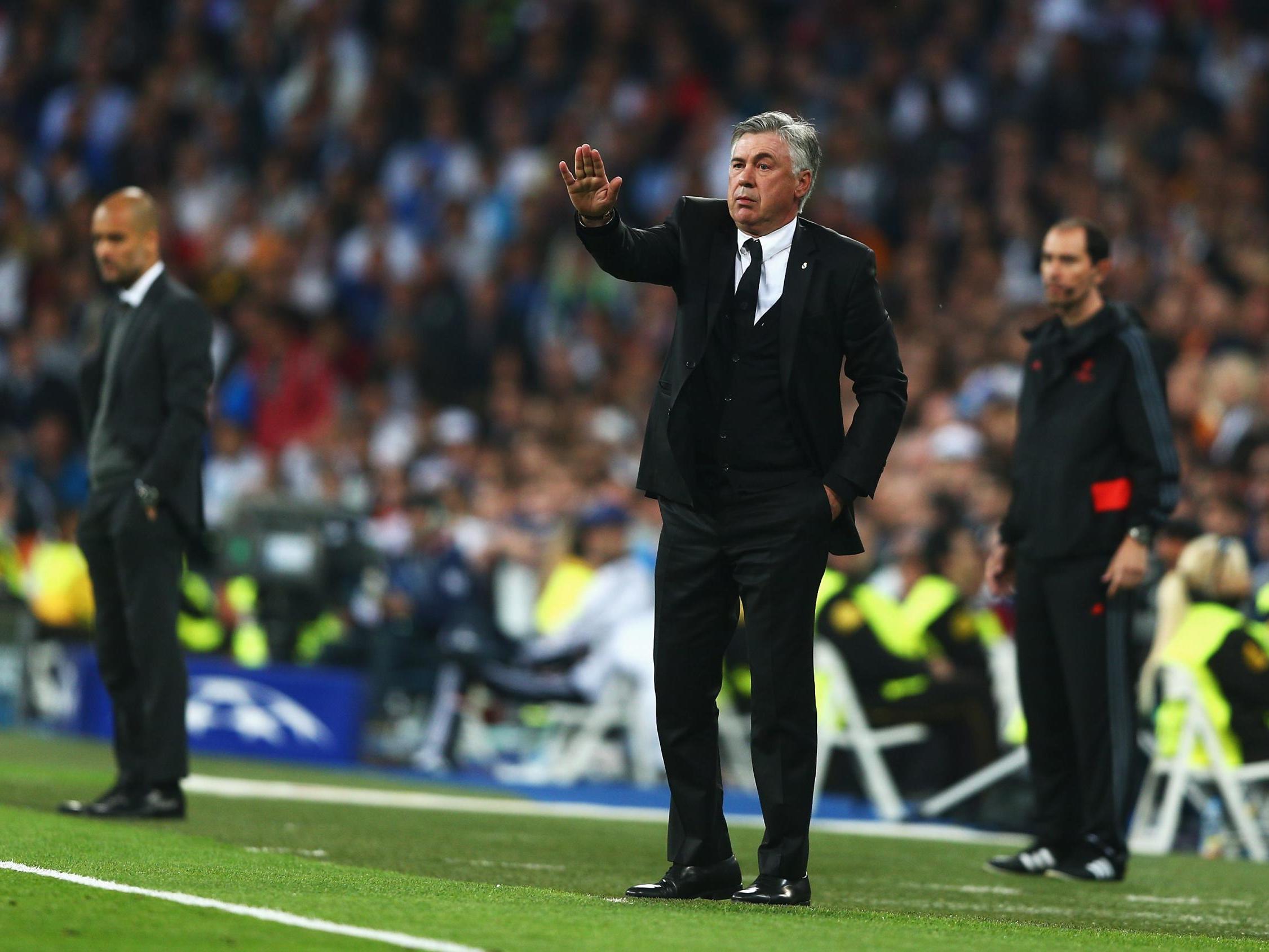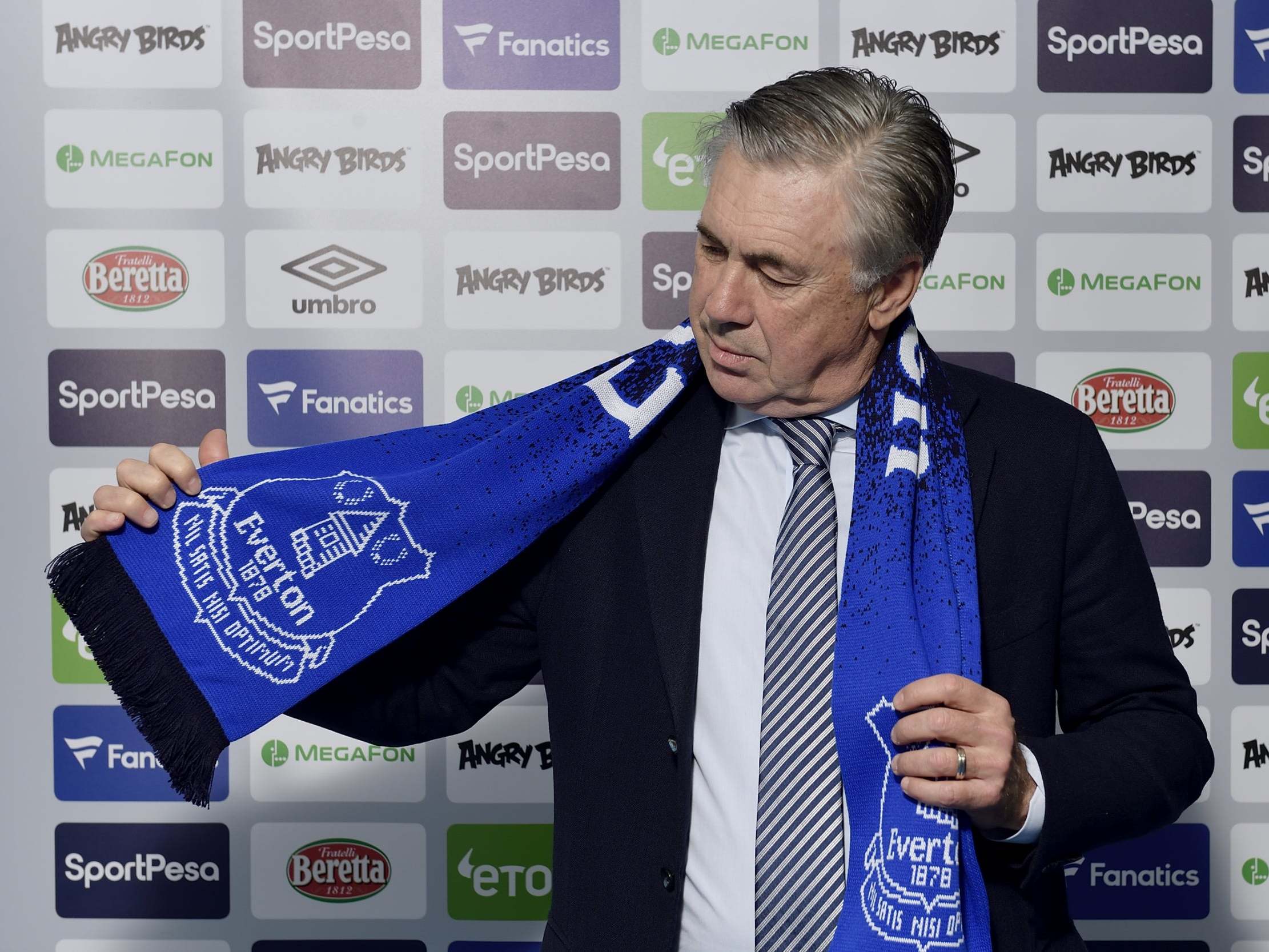Pep Guardiola success exposes realities to Carlo Ancelotti’s league record
The two managers are very different in their approaches – and it shows in the success they’ve enjoyed down the years

Your support helps us to tell the story
From reproductive rights to climate change to Big Tech, The Independent is on the ground when the story is developing. Whether it's investigating the financials of Elon Musk's pro-Trump PAC or producing our latest documentary, 'The A Word', which shines a light on the American women fighting for reproductive rights, we know how important it is to parse out the facts from the messaging.
At such a critical moment in US history, we need reporters on the ground. Your donation allows us to keep sending journalists to speak to both sides of the story.
The Independent is trusted by Americans across the entire political spectrum. And unlike many other quality news outlets, we choose not to lock Americans out of our reporting and analysis with paywalls. We believe quality journalism should be available to everyone, paid for by those who can afford it.
Your support makes all the difference.It was a much more relaxed meeting between Pep Guardiola and Carlo Ancelotti than we will see at Manchester City on Wednesday, but one that reveals a lot about the differences between the two and where they are in their managerial careers. During the Catalan’s sabbatical in 2012-13, the pair were having dinner in New York, only for Guardiola to start complaining about how frustrated he gets when players do not follow his specific tactical instructions.
“You still suffer with that?” Ancelotti wondered, in an exchange detailed in Guillem Balague’s book on Guardiola. “There will come a time when you don’t.”
The latter statement still feels far more indicative of what Ancelotti’s career has been, rather than what Guardiola will become.
There is after all still an awful lot the City manager suffers with, even beyond players following instructions. Another issue is when games get “out of control”. It is partly why he has suffered in the Champions League, and why so many of his biggest ties feel neurotic internal battles as much as matches against the opposition. Guardiola so often seems to suffer from being a victim of his own intensity about the game.
All of this, however, is precisely why he has enjoyed so much more league success than Ancelotti. It points to one of many great differences between the two, and why one is still at the peak of the game and the other must embark on something of a left-field job – for both himself and Everton.
It is also what is most crucial to Ancelotti’s time at Goodison Park and whether he can fulfil the expectation of lifting the club to the exalted level they feel they should be at.
Many will point to that Champions League record as the most reassuring evidence, given he secured the trophy a record three times. It is certainly a record that Guardiola would love to point to for himself, and something else he privately suffers with given he still only has two European Cups.
But as prestigious as that knock-out competition is, a mere knock-out competition it remains. Ancelotti’s actual domestic league record makes this much more complicated. It isn’t all that compelling. It might even just be par, or worse.
It is fairly stark, after all, that 19 seasons at the biggest and wealthiest clubs in Europe have yielded only four league titles. Two of those were effectively guaranteed, meanwhile, since they came at Paris Saint-Germain and Bayern Munich.
Two of his other seasons at such clubs involved two of the biggest shocks in recent European history, as PSG lost one title to Montpellier and Real Madrid finished third behind Atletico Madrid. If you were to actually judge Ancelotti’s league finishes against the economic position of his clubs, he has mostly under-performed.
In those 19 years, the Italian has almost always found himself at the first or second most financially powerful clubs in their leagues, with only Napoli last season any way debatable in that.
Despite such advantages, he has finished outside the top two as many as eight times in that spell. Milan, where he won the Champions League twice and thereby created such an aura about himself and that team, is perhaps the most damning. Ancelotti only won one title in eight years with that squad. He actually got to the final of the Champions League more often than he finished in the top two of Serie A – three occasions to two.
Since the round-robin nature of the domestic league remains the most mathematically reliable indicator of actual performance and managerial effect, it does raise pertinent questions about Ancelotti’s career and how suited he is to a job like Everton’s. He clearly isn’t quite the guarantee that Champions League record would indicate.
Much of this is also made more pronounced by direct comparisons with Guardiola. The Catalan is not just the most tactically influential manager of the modern era, but also the one with the most consistent league-winning record at the top level with eight from 10 full seasons. That has set a template as well as a pace.
Intensity has such a profound effect, both in terms of how a manager works and why he works. It is intensity of idea and philosophy as much as intensity of training, all of it coming together in what almost amounts to ideological purity – and the emotional purity of victory.
All of the current top managers conform to this, from Guardiola to Jurgen Klopp to Mauricio Pochettino. All of the next generation are following this approach.
It is not what Ancelotti follows. This was something that quickly became apparent on one of the other occasions when Ancelotti and Guardiola crossed paths in Munich.
The Bayern players were shocked at the Italian’s lax preparations compared to the meticulous nature of Guardiola.
Forensically prepared drills, designed for players to more deeply understand tactical approaches to instinctively replicate them on the pitch, were replaced by low-intensity games. While some of this laissez-faire approach was initially welcome after players had grown wary of Guardiola’s intensity, it soon gave way to something more damaging. The players began to train together on their own, as they found they were no longer able to execute some of the approaches the Catalan had instilled.
By the time Ancelotti was sacked, halfway through the next season, Bayern were a fairly shapeless mess.

Many at Everton might point to another time when Guardiola was managing at Bayern and Ancelotti was leading the opposition. It was in the 2013-14 Champions League semi-final, when Real Madrid picked off the German champions for a 4-0 win in Munich to make it 5-0 on aggregate.
Guardiola would later describe his decision to listen to his players and go with a 4-2-4 formation as the biggest “fuck up” of his career, and it is also true Bayern had slacked off after winning the Bundesliga.
It is similarly undeniable Ancelotti stepped up. Everyone agrees he is a brilliant tactician with an instinctive insight for this kind of thing. It is why he so quickly figured out how to get at Bayern in that tie, and why he has so quickly come up with formations that please demanding chairmen at Milan and Chelsea.
The problem, though, is replicating his Champions League record on a domestic level. One top pro has confided “he would not have wanted” Anclelotti as a league manager because he has “no intensity at all”. “You need that to win leagues and to be on top of the players every week,” he said.
Another managerial contemporary greatly likes Ancelotti – as many do – and thinks he’s “immensely talented”, “but lazy”. It can condition a slackness in his teams that means they don’t often overachieve.
Then again, one argument is that it’s not even about overachieving for Everton right now.
it’s about just getting back to par and re-establishing themselves as at least the seventh best club in the country while playing good football.
If Ancelotti can do that, while doing something he is very good at and winning a cup along the way, many at Everton will have thought it totally worthwhile.
Those who know him meanwhile say he is genuinely fired up for this job, and that he wants to prove himself at such a level again. He has certainly proven he has the capacity to make Guardiola suffer in individual games, as he has illustrated in their one major previous meeting.
The wonder is whether Ancelotti quite suffers enough to make it work.
Join our commenting forum
Join thought-provoking conversations, follow other Independent readers and see their replies
Comments